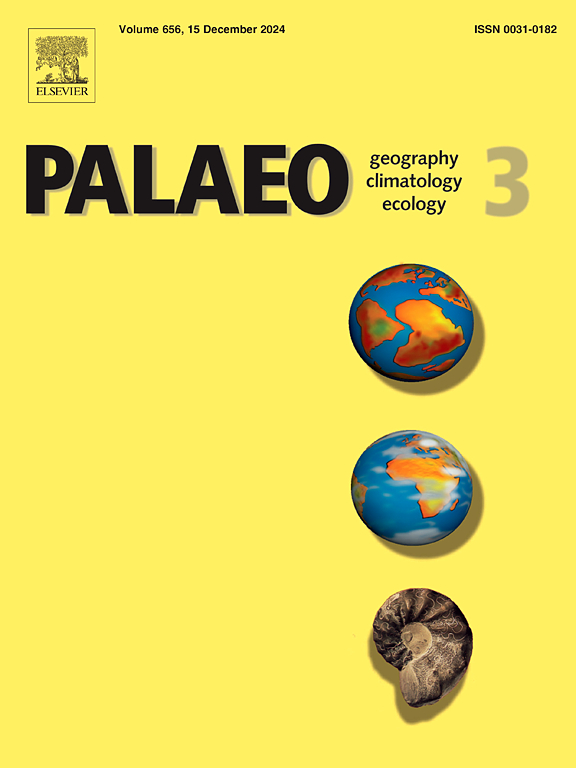Late Cenozoic deformation of the northeastern Pamir and the west Kunlun Mountains: Insights from anisotropy of magnetic fabrics and sedimentary analysis
IF 2.6
2区 地球科学
Q2 GEOGRAPHY, PHYSICAL
Palaeogeography, Palaeoclimatology, Palaeoecology
Pub Date : 2024-09-29
DOI:10.1016/j.palaeo.2024.112521
引用次数: 0
Abstract
Understanding the late Cenozoic temporal and spatial development of northeastern Pamir and the west Kunlun Mountains (WKMs) is critical for our knowledge of intracontinental orogeny in Central Asia. In this study, sedimentary analyses and anisotropy of magnetic fabrics (AMF) studies were conducted in four sections along the foreland of the northeastern Pamir and the WKMs. Combined with the results of previous researches, our AMF and sedimentological results reveal a shift in paleocurrent directions from variable azimuths in the Kelizuoyi Formation to northward-directed azimuths in the upper strata in the Kekeya, Keliyang and Keyikejia sections, suggesting a gradually northward migration of the WKMs and its foreland basin. Since the early Miocene, the prevailing drainage systems in the Aertashi and Paojianggou sections have been mainly controlled by the northeastern Pamir and the drainage systems in the Kekeya, Keliyang and Keyikejia sections were controlled by the uplift of the WKMs. The constant paleocurrent and regional strain directions in the Paojianggou section support a pre-existing arcuate Pamir since the early Miocene. Under these circumstances, the evolution of late Cenozoic sediment succession and the characteristics of the AMF in the Paojianggou section were mainly controlled by crustal thickening and exhumation of the Pamir.
帕米尔高原东北部和昆仑山西部的晚新生代变形:从磁性结构各向异性和沉积分析中获得的启示
了解帕米尔东北部和西昆仑山(WKMs)晚新生代的时空发展对我们了解中亚大陆内造山运动至关重要。本研究对帕米尔高原东北部和西昆仑山前缘的四个剖面进行了沉积分析和磁性构造各向异性(AMF)研究。结合前人的研究成果,我们的磁力线和沉积学研究结果表明,古海流方向发生了转变,从凯里卓依地层的多变方位角转变为克克亚、克力洋和克依克甲地段上部地层的北向方位角,这表明西高止山脉及其前陆盆地逐渐向北迁移。自早中新世以来,阿尔塔什段和保江沟段的主流排水系统主要受帕米尔东北部的控制,而柯克亚段、克里阳段和柯依克家段的排水系统则受西高止山脉隆起的控制。柏江沟段恒定的古海流和区域应变方向支持了早中新世就已存在的弧形帕米尔。在这种情况下,帕米尔晚新生代沉积演替的演化和豹江沟剖面AMF的特征主要受控于帕米尔地壳的增厚和隆升。
本文章由计算机程序翻译,如有差异,请以英文原文为准。
求助全文
约1分钟内获得全文
求助全文
来源期刊
CiteScore
5.90
自引率
10.00%
发文量
398
审稿时长
3.8 months
期刊介绍:
Palaeogeography, Palaeoclimatology, Palaeoecology is an international medium for the publication of high quality and multidisciplinary, original studies and comprehensive reviews in the field of palaeo-environmental geology. The journal aims at bringing together data with global implications from research in the many different disciplines involved in palaeo-environmental investigations.
By cutting across the boundaries of established sciences, it provides an interdisciplinary forum where issues of general interest can be discussed.

 求助内容:
求助内容: 应助结果提醒方式:
应助结果提醒方式:


